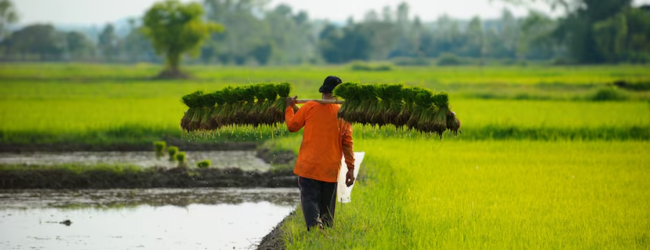Table of contents
Organic farming is a natural and eco-friendly method of agriculture that avoids chemical inputs and focuses on sustainability, soil health, and biodiversity. In India, where agriculture supports over 50% of the population, different types of organic farming are gaining popularity to meet both health and environmental goals. This guide explains all major types of organic farming in India, their techniques, benefits, and real-world application—in a way that even a 15-year-old can easily understand.
Major Types of Organic Farming in India

India follows several types of organic farming systems based on resources, regional climate, and farming goals.
1. ✅ Pure Organic Farming
This method uses no artificial chemicals at all. Only natural fertilisers and bio-pesticides are allowed.
Practices:
- Cow dung and compost for nutrients
- Neem-based sprays for pests
- Manual weeding
Best For: Small-scale farmers focusing on health-conscious consumers.
2. 🔁 Integrated Organic Farming
Here, crop and animal farming are combined. It creates a closed-loop system where farm waste is reused.
Example:
- Cow dung → Compost → Fertiliser for crops
- Crop waste → Animal feed
Benefits:
- Zero waste
- Reduces external input cost
3. 🔄 Crop Rotation Organic Farming
Farmers change the type of crop grown in a field every season or year to improve soil health.
Example Crop Cycle:
| Year | Crop |
|---|---|
| 1 | Legumes (e.g., lentils) |
| 2 | Vegetables |
| 3 | Grains (e.g., wheat) |
Benefits:
- Controls pests naturally
- Boosts soil fertility
4. 🌿 Natural Farming (Zero Budget Natural Farming – ZBNF)
Founded by Subhash Palekar, this method uses zero chemicals and almost no external inputs.
Key Elements:
- Jeevamrut (fermented cow dung tonic)
- Mulching
- Cover cropping
Why It’s Trending:
- Low cost
- Environmentally safe
5. 🌱 Biodynamic Farming
Based on the principles of cosmic rhythms, developed by Rudolf Steiner.
Unique Features:
- Uses special preparations like BD500 (cow horn manure)
- Planting as per lunar cycles
Popular in: Karnataka, Maharashtra, Himachal Pradesh
6. 💧 Vermiculture Organic Farming
Involves the use of earthworms to create nutrient-rich compost (vermicompost).
Benefits:
- Improves soil structure
- Increases water retention
Widely used for: Fruits, vegetables, floriculture
7. 🍀 Green Manure Farming
Green plants (like sunhemp or clover) are grown and ploughed back into the soil to increase organic matter.
Benefits:
- Improves soil fertility
- Acts as a natural pest repellent
8. 🌾 Organic Horticulture
Applies organic practices to fruit and vegetable production.
Used Techniques:
- Drip irrigation
- Bio-insecticides
- Net houses
Popular Crops: Mango, guava, tomato, cabbage
Comparison Table of Organic Farming Types
| Type | Inputs Used | Main Benefit | Suitable For |
|---|---|---|---|
| Pure Organic | 100% Natural | Best for health | Small farms |
| Integrated Organic | Mixed (crop + animal) | Resource recycling | Medium farms |
| Crop Rotation | Varies | Soil health + pest control | All farm sizes |
| Natural Farming (ZBNF) | Local resources | Zero cost farming | Low-income farmers |
| Biodynamic | Cosmic-based | Soil vitality | Advanced farmers |
| Vermiculture | Worm compost | Soil structure & nutrients | Horticulture farms |
| Green Manure | Legume plants | Soil nitrogen | Organic cereals, pulses |
| Organic Horticulture | Bio methods | Healthy fruits & veggies | Gardeners & fruit farms |
Why India Needs Organic Farming in 2025

- Over 30% of Indian soil is degraded due to chemical use (ICAR data).
- India has 4.43 million organic producers – the highest in the world (FIBL, 2024).
- High demand for organic exports like tea, spices, and rice.
India aims to increase organic area to 20 million hectares by 2030.
ALSO READ | Disadvantages of Organic Farming: Hidden Costs & Challenges for Farmers in India
Benefits of Practising Organic Farming
- Safe food free from harmful chemicals
- Higher income from premium pricing
- Better soil fertility
- Low input cost in the long term
- Supports climate-resilient agriculture
Challenges to Organic Farming in India
- Initial low yields in the transition phase
- Certification is costly and time-consuming
- Lack of organic markets in rural areas
- Short shelf-life of some organic products
ALSO READ | Advantages of Organic Farming: Boosting Soil Health & Fertility Naturally in 2025
Tips for Starting Organic Farming in India

- Start with one acre or less to gain experience.
- Choose local and climate-suitable crops.
- Attend government training or Krishi Vigyan Kendra (KVK) programs.
- Apply for certification under NPOP (National Programme for Organic Production).
- Explore schemes like PKVY (Paramparagat Krishi Vikas Yojana).
Need Expert Guidance?
Starting a business can be challenging, but you don’t have to do it alone! At Boss Wallah, our 2,000+ business experts are ready to provide valuable insights and guidance. Whether you need help with marketing, finance, sourcing, or any other area of any business, our business experts are here to help you succeed
Confused about Which Business to Start?
Want to start your own business but unsure which one to choose? Explore Boss Wallah, where you’ll find 500+ courses by successful business owners, featuring practical, step-by-step guides on starting and growing various businesses.
Find your perfect business idea today
Conclusion
Understanding the types of organic farming helps farmers, agri-entrepreneurs, and even students to make smart, sustainable choices in 2025. Whether you’re practising natural farming in a small village or vermiculture in your backyard, organic farming is the future of Indian agriculture—eco-friendly, income-generating, and health-conscious.
Frequently Asked Questions (FAQs)
The main types are pure organic, integrated, crop rotation, natural (ZBNF), biodynamic, vermiculture, green manure, and organic horticulture.
Natural Farming (ZBNF) is considered the most cost-effective due to its low input requirements.
Yes, with growing demand for chemical-free food and premium pricing, it can be highly profitable.
Schemes like PKVY, MOVCDNER, and National Mission on Sustainable Agriculture support organic farming.
Yes, studies show that with proper planning, organic farming can ensure food security and sustainability.
Usually, it takes 2-3 years to fully transition and get certified.
Natural farming avoids all external inputs, while organic farming allows some certified natural substances.
Pulses, vegetables, fruits, cereals, and medicinal plants grow well under organic conditions.
NPOP stands for National Programme for Organic Production—it provides guidelines and certification for organic farming in India.
Yes, vermicompost improves soil health and nutrient balance without harming the environment.


